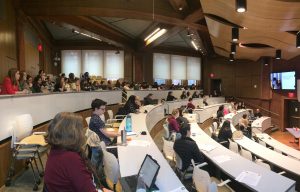Many students, some Smithies included, have found themselves in the midst of political upheaval since President Trump’s move to rescind DACA. The Deferred Action for Childhood Arrivals program protects eligible youth from deportation. The administrative program implemented in 2012 by former President Barack Obama also grants recipients work permits. Though the current status of DACA viability is complicated, the March 5th protection expiration date has passed. OUSR (Organizing for Undocumented Students’ Rights), the School for Social Work, and the Center for Religious and Spiritual Life co-sponsored a two-day conference including speakers and workshops to address the challenges faced by DACA students and mixed-status families.

Students, administrators, faculty, and community
members attended the event on Friday
CRSL Director Matilda Rose Cantwell opened the first panel for discussion after introducing speakers Dan Berger and Dr. Diana Sierra Becerra. Berger is an immigration lawyer in Northampton, and Becerra is an author and lecturer at Smith College, specializing in “the histories of women and gender in Latin America, with a particular focus on social movements and revolutions” (view her Faculty profile here).
Dr. Becerra provided political insights on the history of United States intervention, policy, and migration. She outlined a devastating history of U.S. military intervention, which has contributed directly to circumstances that force people to migrate. Attendees were disturbed to hear that “by the end of the 1980s, over 300,000 people were killed as a result of U.S. intervention.” NAFTA and Clinton’s “Operation Gate Keeper” mark distinct points in a history of harmful U.S. international relations. Drawing inspiration from the Black Liberation Movement, among other revolutionaries, the scholar-lecturer pushed for advocacy that fights for rights beyond citizenship: “grassroots campaigns must win reforms for immediate change…the strategy should inflict political and economic costs on ICE,” Becerra advised.
Becerra reflected specifically on the history of El Salvadorians, who make up the sixth largest immigrant group in the United States. One student participant, whose country of origin is El Salvador, offered her advice to students: critically assess academic discourse and recognize that in efforts to preserve their safety, undocumented students may not be able to speak to their experience in the classroom.
Immigration lawyer Dan Berger gave a logistical presentation on the specific legal challenges DACA students and their families face on a national and local level. “When your soccer team is taking a trip to Montreal, and you can’t cross the border, what do you do? How do you talk to your coach?” Berger pointed students to the Educators for Fair Consideration website, E4FC.org, for legal information pertaining to undocumented students. His practical approach encouraged colleges to cultivate legal resources so that students and their families may have support and guidance on their specific approach to legal protection.
Three students participants echoed Berger’s recommendation when they pushed for a “point person” on campus. This person would be a trained, up-to-date confidant and resource for undocumented Smithies. One of these students also expressed that both Student Financial Services and Counseling Services at Smith do not effectively attend to undocumented students.
When one of the student participants in the panel faced DACA revocation, she turned to Queer and Feminist studies at Smith for inspiration on a radical approach to action. OUSR gave her voice a platform.
To bring yourself up to date and harness your role in supporting undocumented Smithies, you can attend OUSR on Sundays at 2pm in the lower level CC. Email ssjic@smith.edu to sign up for email alerts.
